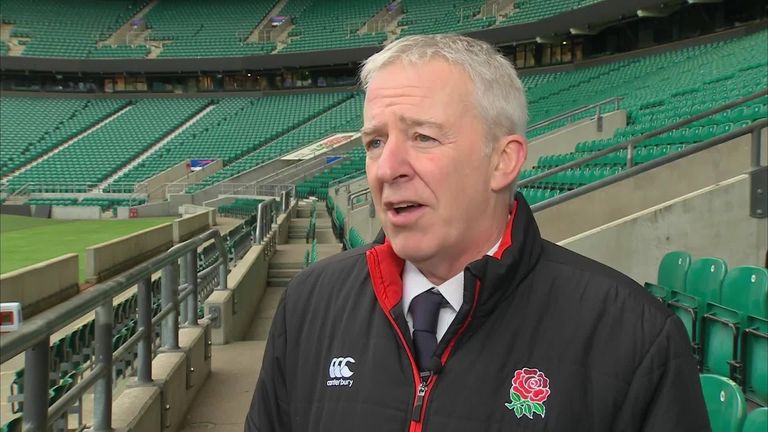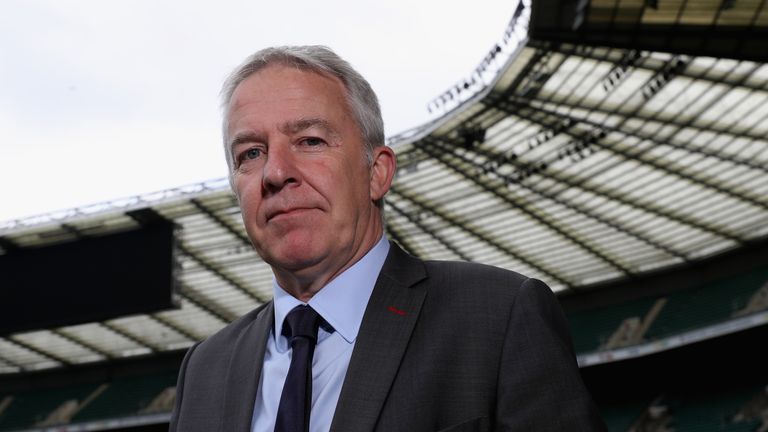Rugby will change, says Nigel Melville, as report reveals injury increase
Wednesday 9 January 2019 16:34, UK
The Rugby Football Union's acting chief executive Nigel Melville said it is inevitable rugby will change after a report revealed an alarming rise in injury severity.
Data from the annual injury audit for 2017-18 compiled by the RFU has revealed that while the frequency of match injuries is lower than for the previous season, return-to-play times have climbed for a second-successive year and now stand at 37 days.
As a result of this increase, the overall burden of match injury - which is a combination of both incidence and severity - now stands at the highest level since Twickenham began records in 2002.
"I think the game will change, it always evolves," Melville told Sky Sports. "It always is changing and this is a time when we need to look very closely at the laws to see if we can be a little bit more creative and look at these key areas.
"I think what the data is showing is that there are specific areas we need to look at such as the tackle and the contact area - we'll do that."
Asked why there has been an increase in injuries, Melville said: "I think the intensity of the game has increased in many ways and we're seeing a certain amount of injuries.
"We're also seeing a longer return-to-play, but that sometimes is a player welfare issue where we're actually keeping them off the field longer while we return them to play and make sure we're not rushing players back.
"So I think there's an element of that as well, but obviously it's a concern.
"You don't want players to get injured, you don't want them to miss games. We want them playing the game and enjoying the game. It's a concern; there's things we need to mitigate against as best we can."
Training ground casualties have become an area of concern with the frequency of injury remaining stable, but the severity also climbing to its highest recorded level of 37 days.
In total, 38 per cent of all injuries were incurred during training with concussion the most frequent injury in full-contact sessions.
While the data is for the English game overall - the Gallagher Premiership, English clubs in Europe and England internationals - the report also gives figures for injuries sustained during England training under Eddie Jones.
In 2017-18, there were rises in casualties sustained during rugby skills and strength and conditioning, the former more than double the figure for the overall surveillance period.
The severity of injury sustained has contributed to the increase and this, combined with the small number of England training sessions, has prompted the RFU to advise interpreting the figures "with caution".
However, there is a significant escalation since Jones replaced Stuart Lancaster as head coach at the end of 2015 and last summer the issue was raised by Bath owner Bruce Craig during a meeting of the Professional Game Board.
"Eddie Jones came to the Professional Game Board earlier this year and we actually looked at the data and how could we transition players from an intensity of their club levels to the intensity of international rugby, because it's played at a higher intensity so it goes without saying that you're probably going to get more injuries," said Melville.
"The transition between those two levels is very important for us, so we're managing that with the clubs. Working together you can manage that transition, which I think is starting to show some benefits."
For a third-successive year concussion remains the most commonly-reported match injury at 20 per cent, but there has been a minor reduction compared to 2016-17 with one fewer instance every eight games.
Overall the average absence for each concussion was 19 days, a rise on the previous season due to six concussions where the return to play time was more than 84 days.
This season the RFU implemented a law trial in the Championship Cup, lowering the definition of a high tackle from above the line of the shoulders to above the line of the armpit.
"It's our responsibility to trial things, to try things out to see what we can do to mitigate that particular area, and lowering the tackle height seems to be one of the areas that seem to be of concern," Melville added.
"We haven't got the analysis data yet to finalise what actually has happened, but it's been pretty positive. We are seeing tackles lower, but we also have to be careful we don't have unintended consequences; you lower the tackle to solve one problem and you create another.
"So we have to be very careful about managing these types of trials, but it's good to trial it in the senior adult professional game, and that's where we get the better results."
Melville did not rule out the tackle height law making its way into the Premiership if data suggested it is helping to reduce injuries.
"It depends on the results," he said. "We need to take the results to World Rugby and show them what we've found. They've got some ideas as well, there's a great collaboration there with World Rugby.
"They've got a seminar in March in which they plan to look at the laws, and we can take our data there and we can discuss with them."






